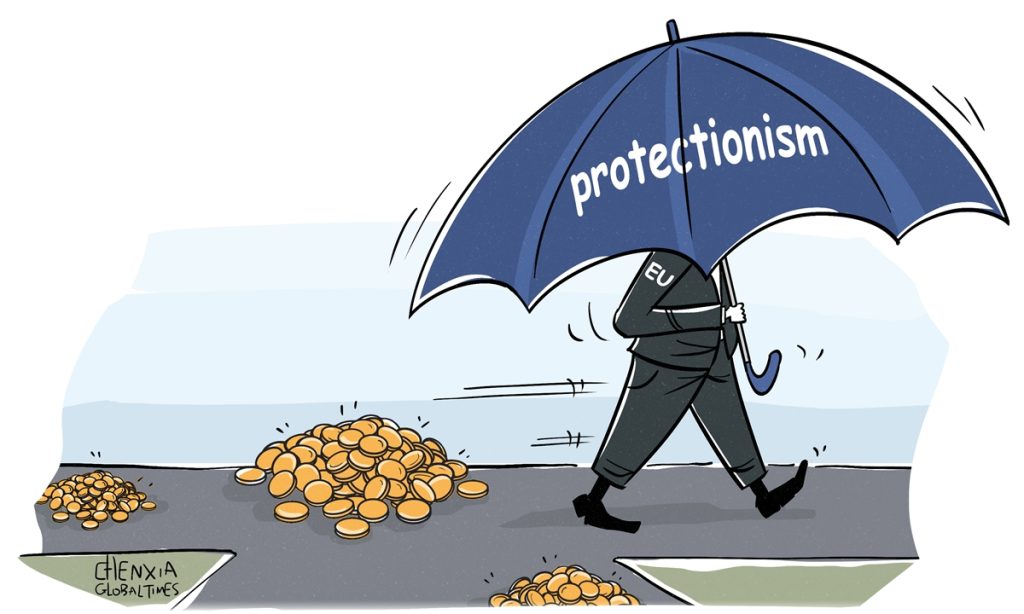Brussel's policy more aggressive, warrants a feasible response: experts

China's Foreign Ministry on Thursday slammed the European Commission's so-called economic security plan, which is reportedly aimed at China, saying that the move will only exacerbate global concerns over the EU's rising protectionism and unilateralism and further undermine Chinese and global businesses' confidence in the EU market.
China's main business group in the EU said the EU's plan could have profound implications for a wide range of areas, including investment, trade and technological cooperation. Such a move also shows that the EU is becoming increasingly aggressive and hostile in its "de-risking" strategy aimed at China, and that China needs to prepare a feasible plan to respond, experts noted.
The European Commission released the so-called European Economic Security Package on Wednesday, which calls for tighter scrutiny of foreign investment and more coordinated controls on exports and technological outflows. While the plans did not name any country, the EU had China in mind, Reuters reported, noting that the EU highlights "de-risking," the bloc's strategy of cutting economic reliance on China.
Commenting on the EU plans at a regular press briefing in Beijing, Wang Wenbin, a spokesperson for the Chinese Foreign Ministry, said that in recent years the international community has had many concerns regarding EU's protectionism and unilateralism in the economic and trade fields, noting the new move will exacerbate such concerns.
"Hopefully the EU will abide by the basic norms of the market economy such as free trade, fair competition, and open cooperation, abide by the rules of the WTO, and avoid the introduction of anti-globalization and pan-security policies and measures," Wang said, stressing that such a move would not only affect the EU's international image but also confidence of companies from China and other countries in the EU's business environment.
The EU's plans, which, according to Reuters, could take three years to enter force, have already sparked widespread concerns. China Chamber of Commerce to the EU (CCCEU), which represents more than 1,000 Chinese enterprises in the EU, said that it closely monitors the ongoing development of the EU's economic security strategy and expresses concerns about the impact of the new plans on Chinese companies' investment, trade, and innovation collaboration within Europe.
"Of particular note, the package suggests enforceable rules to tighten FDI screening and introduces measures that might impact the EU's outbound investment, exports, and research collaborations, potentially influencing the confidence of Chinese businesses investing and operating in Europe," the group said in a statement sent to the Global Times.
The group said that its survey of Chinese firms showed that 52 percent were concerned about the negative impact of the EU's FDI screening mechanism, and 47 percent expressed concern about the possible effects of the "European Economic Security Strategy."
EU's woes
Fang Dongkui, secretary-general of the CCCEU, said that the package will still have to go through deliberation within the EU, but it has highlighted the EU's "inward-looking" trend amid sluggish economic recovery and growth in the Eurozone and the EU.
"The aim of these policies is to 'de-risk,' but 'de-risking' will result in increased costs, including business and compliance costs, and these costs will ultimately be passed on to consumers, with the EU public footing the bill," Fang told the Global Times on Thursday.
While the exact impact of the EU economic security package remains to be seen, the move will bring another round of test for China-EU ties, which have already been under increased pressure due to the EU's increasingly aggressive and hostile tone, experts noted.
"Although the EU publicly claims to be focusing on preventing or reducing risks, its policies have become tougher and more aggressive, especially against China," Cui Hongjian, a professor with the Academy of Regional and Global Governance with Beijing Foreign Studies University, told the Global Times on Thursday.
Cui said that China-EU relations were hoped to improve this year, but if the EU artificially set up barriers, it will be more difficult to improve China-EU cooperation in economy, trade and other fields.
China-EU ties have faced pressure after the EU launched the so-called anti-subsidy investigation into Chinese electric vehicles, which has been criticized by Chinese officials as protectionism. Still, Chinese officials have stated that China is ready to provide an open, inclusive, transparent and non-discriminatory environment for EU and other international businesses.
Experts said that while China has been actively promoting win-win cooperation with the EU, Brussels has become increasingly protectionist and aggressive due to its own economic woes, as well as political and geopolitical factors.
"When some EU institutions and politicians are hyping 'security issues,' they also have their own political motives - that is to cater to populist politics within the bloc or to echo the US' rival strategy against China," Cui said, noting that the EU's "de-risking" or so-called "anti-coercion" strategies against China lack factual basis and are entirely based on speculation and imagination.
Going forward, China-EU relations need a rebalancing, in that stability should be maintained in the overall relationship, but China must also come up with practical responses to EU's aggression in some areas and specific issues, according to experts.
